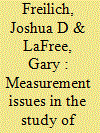|
|
|
Sort Order |
|
|
|
Items / Page
|
|
|
|
|
|
|
| Srl | Item |
| 1 |
ID:
144895


|
|
|
|
|
| Summary/Abstract |
This study article focuses on American far-right (FR) extremists who committed ideologically motivated violent or financial crimes in the United States. We examine three research questions. First, are certain types of FR ideological beliefs associated with different types of criminal behavior? Second, can the various indicators of FR ideology be used to create a scalar measure of commitment to FR ideology? Third, which typology of the FR movement provides the most reliable measure of FR extremism? We use data from the United States Extremist Crime Database to measure indicators of FR ideology in a sample of 305 FRs who committed a financial crime or homicide between 2006 and 2010 in the United States. Conspiratorial, antigovernment, and antitax beliefs were positively associated with risk of financial crimes, while xenophobic, survivalist, and anti–gun control beliefs were positively associated with risk of violent crimes. A factor analysis created a commitment to FR ideology scale and identified four sub-types of FRs: Conspiracy Theorist, Survivalist, Movement Participant, and Proud far-rightist. The factor analysis did not support the prevailing typologies. Importantly though, these typologies were useful in predicting criminal behavior patterns of far rightists. We outline a number of other measurement issues for future research to address.
|
|
|
|
|
|
|
|
|
|
|
|
|
|
|
|
| 2 |
ID:
144897


|
|
|
|
|
| Summary/Abstract |
This study proposes a novel methodology for the study of the mindset, motives, and cognitive style of individual suicide bombers in Israel/Palestine, based on a comprehensive corpus of personal farewell letters (which also serve as last wills) that were written by suicide bombers to their family during the Second Intifada (2000–2006). To avoid privileging certain a priori sentiments, motivations, or concepts over others, I used a programmatic “bottom-up” sequence of quantitative psycholinguistic procedures, in which prominent themes or concepts from one level of analysis are further qualified and contextualized in the next. This afforded a minimally biased view of the cognitive content of Palestinian suicide bombers, including the sentiments, motivations, and concepts that they were more preoccupied with, and the context in which these ideas were expressed. The results are largely consistent with theories of political violence that place pro-social sentiments at the forefront of the motivations for suicide terrorism, and paramount to antisocial sentiments such as hatred and revenge. Since the linguistic patterns that were uncovered in this analysis cannot be controlled consciously, and the farewell letters of suicide bombers have rarely been rigorously analyzed linguistically, this study may provide an unprecedented glimpse into the cognitive style and content of individual suicide bombers—a glimpse that is minimally biased by political, partisan, or sectarian preconceptions.
|
|
|
|
|
|
|
|
|
|
|
|
|
|
|
|
| 3 |
ID:
144889


|
|
|
|
|
| Summary/Abstract |
In this article, we introduce readers to a special issue of Studies in Conflict & Terrorism on measurement issues in the study of terrorism. In recent years scholarly interest in terrorism has increased and systematic methods are now more commonly used. Terrorism works that analyze data highlight substantive findings as opposed to measurement issues. A study's substantive findings are only meaningful though if it correctly addresses the measurement issues that invariably arise during the research process. In addition to summarizing the eight articles in this special issue, we outline the strengths and weaknesses of various measurement strategies and assess their contributions to our understanding of terrorism. The major goal is to place the special issue's contributions in context and highlight under-explored issues that future research could address.
|
|
|
|
|
|
|
|
|
|
|
|
|
|
|
|
| 4 |
ID:
144896


|
|
|
|
|
| Summary/Abstract |
Many prior studies have analyzed how country characteristics affect the rate of terrorist violence and there is a growing literature on how group traits influence terrorist violence. The current study expands on this literature by using multilevel modeling to assess both these units of analysis on the rate of domestic attacks and the rate of attacks against foreign targets. Using data from the Big Allied and Dangerous and the Global Terrorism Database, a cross-national sample of 224 terrorist groups are modeled in relation to their countries of origin to assess rates of domestic attacks. In this cross-sectional study many of these terrorist groups target multiple foreign countries. Multiple membership random effects modeling (MMREM) is used to assess the impact of multiple countries targeted by a group. The results of the study indicate that multilevel modeling provides an improved statistical fit and the MMREM model provides an improved measurement for analyzing attacks targeting foreign countries.
|
|
|
|
|
|
|
|
|
|
|
|
|
|
|
|
| 5 |
ID:
144893


|
|
|
|
|
| Summary/Abstract |
The nature of underreporting terrorism in developing countries is often acknowledged but poorly understood. Focusing on India, we triangulate terrorist attacks captured across three media-based datasets (Global Terrorism Database, South Asia Terrorism Portal, Worldwide Incident Terrorism System) against official police records from Andhra Pradesh. Results suggest that media-based datasets capture the geographic prevalence of terrorism yet severely underestimate the frequency of violence, biasing toward lethal bombings. Considerable variation is present for attacks targeting specific classes or types of actors. Similar to other crimes, the results suggest that existing terrorism databases represent a select version of violence in these countries, discounting the prevalence and regularity of non-lethal violent activity.
|
|
|
|
|
|
|
|
|
|
|
|
|
|
|
|
| 6 |
ID:
144891


|
|
|
|
|
| Summary/Abstract |
The number of journal articles that rely on data derived from interviews with extremists has increased substantially over the past decade. This burgeoning invites the possibility that standardized reporting practices have not been explicitly clarified. To date, there has not been an adequate review of the methodological transparency of journal articles that include interviews with extremists. After content analyzing 48 articles involving such interviews, we found that field-wide methodological transparency is lacking. Recommendations are made with regard to enhancing methodological transparency, with the implication that consensus on optimal reporting practices within the extremism literature should be reached soon.
|
|
|
|
|
|
|
|
|
|
|
|
|
|
|
|
| 7 |
ID:
144892


|
|
|
|
|
| Summary/Abstract |
Open-source event data sets frequently used for social science analysis rarely provide any transparent explanation of the credibility of sources or the validity of data thereby obtained. We develop a sample Source Evaluation Schema for the purpose of operationalizing measures of open-source event validity at the case, source, and variable levels. Based on our findings, we argue that explicitly incorporating and disclosing credibility and validity levels allows for greater flexibility in tailoring the inclusion of cases for researchers' specific analytical requirements. By facilitating more transparent analyses, the inclusion of such measures in similar datasets can result in more defensible conclusions, especially in highly charged political and security contexts such as those surrounding terrorism.
|
|
|
|
|
|
|
|
|
|
|
|
|
|
|
|
| 8 |
ID:
144890


|
|
|
|
|
| Summary/Abstract |
This article focuses on a challenge in the current terrorism literature, namely the methodological justification concerning the collection and analysis of empirical data. Lack of detailed methodological accounts of the collection and analysis of the data makes it difficult to evaluate presented findings, especially if these data are confidential or focused on specific aspects of the phenomenon. This article offers an extensive overview of the methodological procedures conducted in a large empirical research project on jihadist networks based on confidential police files (2000–2013), interviews, and trial observations. The article illustrates how grounded theory–based methods can be used to collect and analyze such data and to develop and test new theories in this research field.
|
|
|
|
|
|
|
|
|
|
|
|
|
|
|
|
| 9 |
ID:
144894


|
|
|
|
|
| Summary/Abstract |
This study identifies the most efficient methodology for sampling from a population of New York Times articles related to terrorism, which were generated through keyword searching. Efficiency was based on which sample statistic was closest to the population parameters of interest. The smallest sample size, where 68 percent of the sample statistics were within one standard deviation of the population mean and 95 percent of the sample statistics were within two standard deviations of the population mean, were identified as the most efficient. In addition, we determine whether the frequency of news articles is correlated to the temporal distribution of terrorist incidents found in the Global Terrorism Database, which could possibly be utilized to more efficiently sample from the population. Our findings confirm prior research that shows that sampling efficiency is related to the weekly news cycle and, contrary to prior research, the sample must include between 20 to 29 constructed weeks to achieve representativeness of an entire year of coverage for a population generated through keyword searches. In addition, the study also found that there was a limited relationship between the frequency of terrorist incidents and the amount of terrorism coverage in the news.
|
|
|
|
|
|
|
|
|
|
|
|
|
|
|
|
|
|
|
|
|